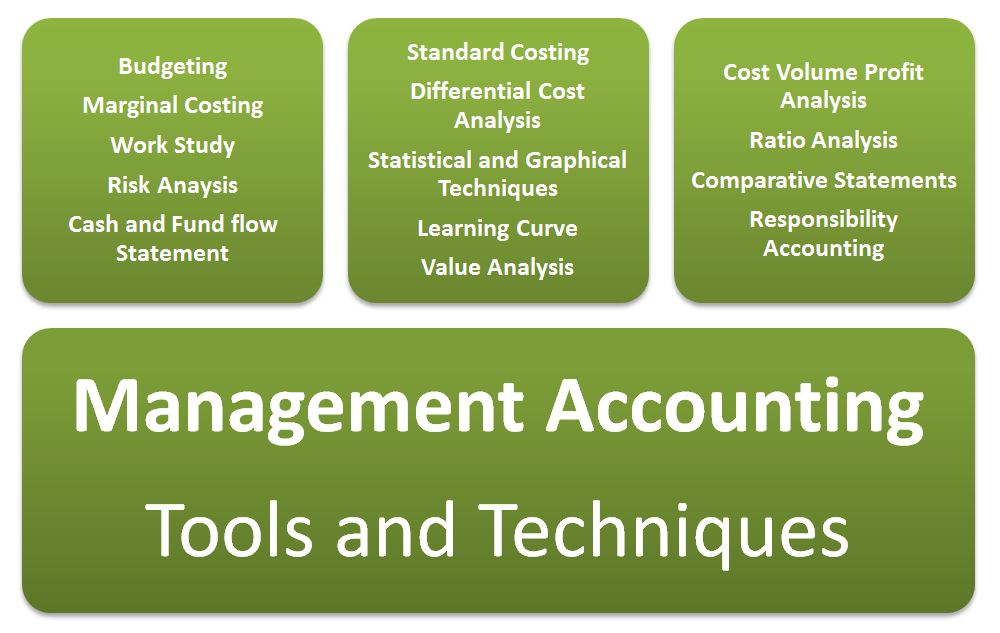Management Accounting may be simply defined as tools and techniques that provides accounting information to carry out management activities such as planning, controlling, evaluating and decision making. It helps managers in identifying problems, formulating strategy, decision making, optimizing the use of resources, planning and controlling.
According to the Institute of Charted Accountants of England “any form of accounting which enables a business to be conducted more efficiently is Management Accounting”.
According to Institute of Cost and Work Accounts of India (ICWA) “Management Accounting is a system of collection and presentation of relevant economic information relating to an enterprise for planning controlling and decision making”.
Management Accounting Tools and Techniques take data from Financial Accounting, Cost Accounting and Allied Accounting Subjects and provide good qualitative and quantitative information to managers for forecasting and planning future financial activities.
Nature/Characteristics of Management Accounting
(a) It helps management in decision making. The information provided through management accounting is only for internal use of management and is not distributed to third parties.
(b) It is an optional technique – There are no statutory obligations regarding adoption of management accounting tools nor are there any obligations to furnish management accounting information. A firm may choose to adopt accounting techniques totally depending upon its utility and desirability.
(c) It is concerned with the future as it helps managers to take decisions related to the future.
(d) There is flexibility in presentation of information as there are no prescribed formats for presentation of accounting information. The management may identify and choose their problems and pick the relevant format that solves the problem depending upon its utility.
(e) It makes use of information and reports from Financial Accounting, Cost Accounting, Tax Accounting and other accounting disciplines to help management to forecast, plan and take better decisions.
Functions of Management Accounting
Operational functions
- Recording of data
- Validating the data
- Interpretation of data
- Communicating the data
Theoretical Functions
(a) To help in Planning – It helps managers to forecast and plan for short-term and long- term future activities or goals.
(b) To help in Organizing – By providing proper and useful financial reports to different departments of a business it increases coordination within the departments.
(c) To help in Controlling – It helps in controlling through control techniques such as ratio analysis, budgetary control, standard costing, internal audit etc.
(d) To help in Communicating – It helps to communicate in form of reports, charts, presentations etc.
(e) To help in Decision making – The accounting techniques involve analysis, interpretation and presentation of data in a non-accounting language that helps the management to understand financial data and use it to take better decisions.
(f) To help in Tax management – It helps to minimize the tax liabilities and take advantage of various provisions of income tax law.
(g) To Provide Quality information – Itprovides good quality information by using techniques such as marginal costing, differential costing, CVP analysis etc. This helps managers to take decisions like product pricing, make or buy decision, capital expenditure etc.
Advantages of Management Accounting
♦ It brings regularity in the business by improving cash flow of the business through good budgetary control. It determines unnecessary expenditures and presents a road map for future business expenditure.
♦ It ensures maximum returns on capital employed. It provides both qualitative and quantitative information in form of reports to the management for good decision making.
♦ It leads to optimization of resources and improves efficiency by removing unwanted elements.
♦ Its tools and techniques helps the management to analyse various costs associated with the operations of the company with the aim to lower their operational expenses.
Limitations of Management Accounting
♦ Management Accounting Information is based on historical data. Information and hence management decisions depend upon the accuracy and reliability of past data. Incorrect or inaccurate data will lead to incorrect management decisions.
♦ Lack of Knowledge of financial managers to furnish good quality reports.
♦ It is a complicated and complex approach
♦ It is not a substitute for management it only provides information useful to take decisions.
♦ It is a costly system of accounting
♦ It is reletively new and still in its developing stage
♦ It may face resistance from the existing accounting staff.
♦ The information provided by management accountants may be influenced by personal bias of the accountant
